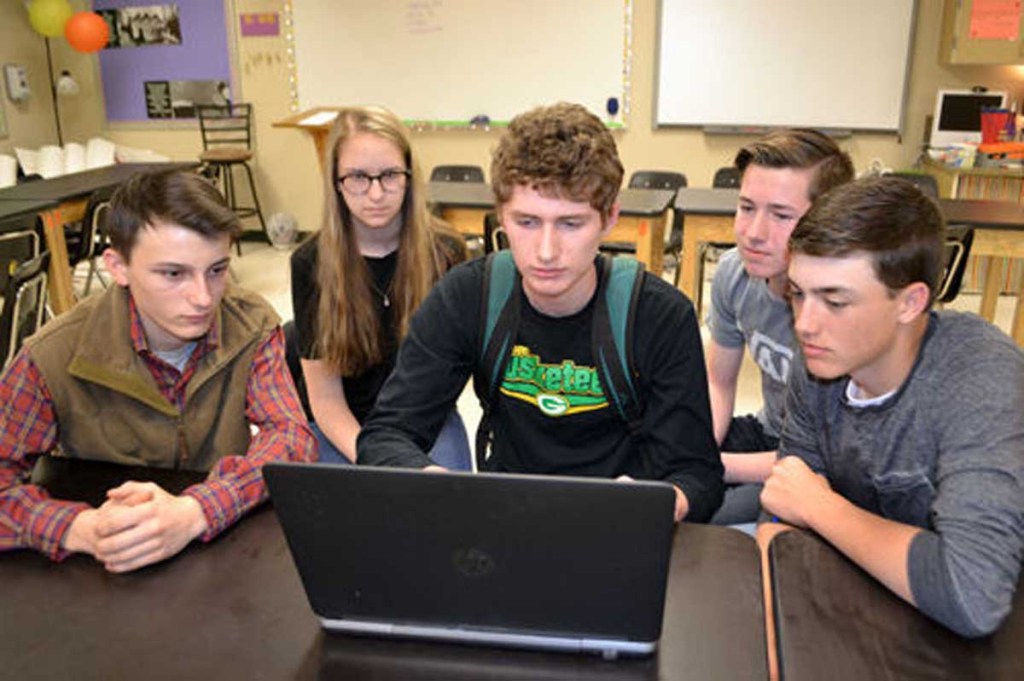Breaking down cultural barriers virtually: Ky. students connect with Pakistani counterparts
Published 3:55 pm Sunday, March 27, 2016

- Preparing to send pictures to students in Pakistan are, from left, Jorden Colegrove, Audrey Craft, Ethan Spradlin, Nick O'Connor and Ryan Lambert.
LLOYD, Ky. – The first question Pakistani high school students asked about life in the Bluegrass State was about Kentucky Fried Chicken, according to their eastern Kentucky counterparts.
The Pakistanis, all students at a high school in Islamabad, also were curious about the distinctive twang Kentuckians display whenever they speak. They were also certain the Greenup teens all lived in the same hills and backwoods as the cinematic depictions from which they draw their mental pictures of Appalachia.
But they also had more serious queries. They wanted to know more about American politics. They asked the Greenup County High School (GCHS) students about the upcoming presidential election, mainly wondering about Donald Trump and what they perceive as his embrace of Islamophobia.
Next, they followed up with questions about drugs, pollution, racism and climate change.
The GCHS students, all sophomores, did their best to paint a verbal picture of American life and culture, and asked plenty of questions of their own.
Some of them were the usual teenage preoccupations: How do you dress? What do you do for fun? But the GCHS students also waded into the deeper waters of child labor, poverty and other issues.
The two groups of students, although half a world away geographically, have been connected digitally since January through the nonprofit Global Nomads Group, which works with educators and students around the world to promote communication and understanding.
About 20 students are getting to know a similar number of Pakistani students through the organization’s pilot program called Campfire, said social studies teacher Jill Armstrong.
So named for its metaphorical suggestion of conversation and stories told around a flickering fire, the program brings disparate groups of students together via Skype and online forums.
The intention is to stimulate communication and ultimately to improve the world and communities on both sides of the exchange.
GCHS is one of 10 Kentucky schools involved in the pilot, all matched with schools in Pakistan; Another Kentucky school has also been accepted, but so far has been unmatched with a partner school. Its original partner school withdrew because of security issues, Armstrong said.
The students needed no prompting to get digitally acquainted. “A lot of us connected with them on other social media like Snapchat and Instagram,” said Nick O’Connor.
Soon they were exchanging pictures and learning more about each others’ lives and lifestyles.
In fact, most of their communication has come through social media because the schools are on widely different time zones, making it impractical to Skype.
Students on both sides have a better grasp of each others’ religious beliefs and practices.
Among the discoveries at GCHS was that Islamic beliefs are not monolithic, according to Jorden Colegrove. “Muslims aren’t all the same, they have different ways of following their religion. There are different Muslims like there are different Christians.”
More than a feel-good cultural exchange, the program is tool for sharpening analytical skills and crafting thoughtful questions, Armstrong said. “It’s a curriculum of life. They are learning things I don’t think they ever will forget.”
Because they want their Pakistani counterparts to see northeast Kentucky at its best, they also are seeing their own community through fresh eyes, Armstrong said. And that gives them a fresh appreciation for their own hometown, their neighbors and their school.
James writes for the Ashland, Kentucky Daily Independent.

